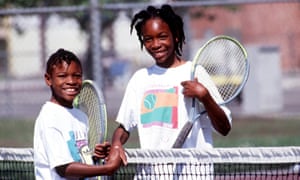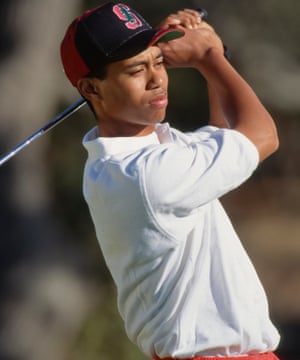
This column comes from the sleepy Austrian town of Götzis, where Katarina Johnson-Thompson has obliterated a world-class heptathlon field, winning four of the seven disciplines. Her event is a supreme test of speed, strength, stamina and technical skill. Yet Johnson-Thompson did not start out wanting to be an athlete. Instead, while still in nappies, she began taking ballet classes. Then, later, she became obsessed with football, kicking about with friends outside her house in Liverpool while wearing a Steven Gerrard top. Only when she was older did she focus on track and field.
I mention this because I have been reading an extraordinary new book, Range: Why Generalists Triumph In A Specialised World, by David Epstein, which skewers what he calls “the cult of the head start” and makes an overwhelming scientific case for playing the sporting field.
Epstein’s book starts with Tiger Woods, who was driving a golf ball past an awestruck Bob Hope at two and shooting 48 for nine holes when four – acts that foretold his sporting genius. Woods’s story, and others such as that of Serena Williams – who began playing tennis at three – have become almost how-to manuals for pushy parents: start them young, train them hard and watch them soar.
Books such as Outliers by Malcolm Gladwell and Bounce by Matthew Syed have reinforced this idea by propagating the 10,000-hour rule for success – something Gladwell describes as the “magic number of greatness”. Their message is simple and seductive: to succeed someone needs 10,000 hours of deliberate practice in an activity, which means it is best to start early. Yet with a few exceptions such as gymnastics, where skill acquisition needs to be developed before maturity, and chess, where developing early pattern recognition is vital, the science does not back that up.
Instead Epstein says most elite athletes are more like Roger Federer, who dabbled in a vast number of sports – including skiing, wrestling, handball, skateboarding, football, badminton – which helped to develop his athleticism and hand-eye coordination, before focusing on tennis much later; or the Ukrainian Vasyl Lomachenko, who took four years off boxing as a kid to learn traditional Ukrainian dance and also did gymnastics, basketball, football and tennis and is now the best boxer in the world.
As Epstein points out, most people think of football as a sport where early specialisation is important. But a 2014 study comparing the development of 52 top German footballers, including 18 national team players, with 50 who played in the fourth to sixth divisions found that emphatically was not the case.
A German study comparing international women players with those who just played in the Bundesliga found a similar story. Those who represented the national team played fewer games up to 18 and did “more peer-led football and coach-led practice in other sports compared to their Bundesliga counterparts”.
There is a message there, especially given that children can now join club academies from as young as eight. It pays to keep sampling other sports and to focus on fun practice before specialising later.
It is not just football, either. A Danish study, which looked at the differences between 148 elite stars in multiple sports – including canoeing, cycling, rowing, sailing, skiing, swimming, track and field and triathlon – compared with 95 near-elite athletes in the same disciplines, found a similarly surprising picture.

As the academics noted, the near-elite athletes accumulated “significantly more training hours as early as age nine and continued to complete more hours through early adolescence until age 15” compared with elites. The elites also had their first national and international competitions at an older age. It did not matter. The elites intensified their training regime during late adolescence and went past them.
Epstein notes that the research points a similar way in most sports. “Eventual elites typically devote less time early on to deliberate practice in which they will eventually become experts,” he writes. “Instead they tend to ‘sample’ a wide number of sports in an unstructured or lightly unstructured environment” before specialising only later.
Why might this be? Part of it is that early specialisation and highly structured training can lead to lower motivation, burnout and potentially increased injury rates. But there is a more fundamental point that Epstein wants to make: acquiring skills in multiple sports, often via unstructured play, helps develop creativity and equips people better to handle fresh challenges later in their sporting life.
Incidentally the rest of Range shows that this theory holds outside sport, too. Epstein, quoting one of the world’s most influential researchers in the psychology of music, suggests the best way to get better is “a sampling period, often lightly structured with some lessons and a breadth of instruments and activities, followed only later by a narrowing of focus, increased structure and an explosion of practice volume”.
Essentially what Epstein is telling us is that what can lead to improvements in the short term can sometimes undermine long-term success. Experiment, have fun, be prepared to fail – and accept that, if you want to succeed, holding obsessively to the 10,000-hour rule is probably not the way to go.
[“source=theguardian”]






